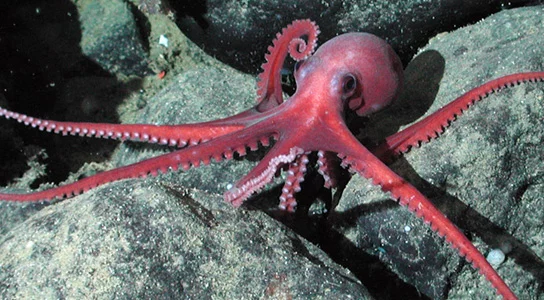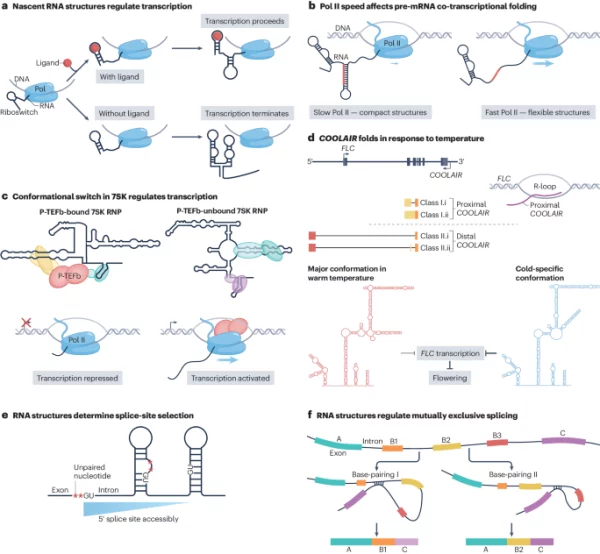Exploring the icy waters of Antarctica has revealed the extraordinary adaptability of marine life, particularly the octopus. This remarkable creature relies not only on genetic evolution but also on RNA editing mechanisms to rapidly adapt to extreme environments. Such mechanisms present vast potential for research, especially in medicine and biotechnology.

At extremely low temperatures, the nervous systems of most organisms struggle to transmit signals effectively. Protein channels in cell membranes, such as potassium channels, play a crucial role in ion conduction for transmitting neural signals. However, in cold conditions, these channels slow down, leading to reduced signal transmission efficiency.
Research by neuroscientist Joshua Rosenthal and colleagues at the University of Puerto Rico (2017), published in the journal Science Advances, showed that Antarctic octopuses developed a unique RNA editing mechanism to overcome this challenge. Specifically, the research team discovered that the potassium channel gene of the Antarctic octopus is nearly identical to that of tropical octopuses, such as those living near the coral reefs of Puerto Rico.
“We expected to see major genetic differences, but the surprising finding was that the genes were nearly identical. The biggest difference lay in how the RNA was edited to suit the environment,” remarked Joshua Rosenthal.
To verify, the researchers injected potassium channel genes from the two octopus species into frog egg cells and measured electrical activity. The results revealed that at normal temperatures, the two genes functioned similarly. However, under cold conditions, the RNA of the Antarctic octopus was edited at 9 critical sites, enabling the potassium channels to close twice as fast, ensuring stable neural signaling even in harsh environments.

Beyond potassium channels, the octopus’s RNA editing capabilities extend to various other biological mechanisms. Rosenthal’s team found that the extent of RNA editing correlated with the coldness of the habitat. This adaptation allows the octopus to quickly adjust without requiring changes to its entire genetic structure, a much slower evolutionary process.
According to a study published in Nature Communications (2018) by researchers at the University of Chicago, RNA editing is not only an adaptation mechanism for octopuses but also a promising avenue for medical applications. “RNA offers rapid adaptability, enabling organisms to respond to environmental changes without waiting for millions of years of evolution,” the research team concluded.
This discovery not only sheds light on the unique biological mechanisms of species living in extreme environments but also unlocks potential technological applications. RNA editing could support the development of therapies for neurological disorders and help humans adapt to rapid environmental changes.
The study of the Antarctic octopus is not just a fascinating biological narrative but also a reminder of nature’s power and its potential applications to enhance human life.


HPX24h > Animals > Secrets to Surviving Antarctic Freezing Cold Through RNA Editing
Top Reads from This Category
Animals
Can Hyena Dogs Be as Smart as Primates?
Animals
Gibbons Develop Vocal Techniques as Powerful as Humans: New Discoveries About Their Unique Sounds
Animals
The Stunning Image of a Cheetah in Action During Its Hunt
Animals
Bee Wax Bust of Nefertiti: The Perfect Fusion of Art and Nature
Animals
Baboons With Stable Relationships Live Longer and Show Greater Kindness
Animals
Why Bedbugs Thrive Through Inbreeding
Animals
Male Spiders Sacrifice Themselves to Protect Future Generations
Discover New Topics
Uncategorized
Why Do Experts Believe Alzheimer’s Is an Autoimmune Disease Rather Than a Brain Disorder?
Science
NSF Job Cuts: Who Benefits and Who Bears the Consequences?
Fitness
Safe Exercises for Early Pregnancy: Tips to Keep Moms Healthy and Strong
Science
A New Era in HIV Prevention: Vaccine Set to Launch
Parenting Tips
Talking to Children About Race: How to Make It Easier?
Animals
The Potential of Black Mamba Venom in Developing New Painkillers
Science
New Discovery: How the Brain Manages Emotions and Memory
Health
E. Coli In The Gut May Trigger A ‘Chain Reaction’ Leading To Parkinson’s Disease
Animals
Can Maggots Heal Wounds Faster Than Surgery?
Healthy Eating
The Benefits and Risks of the Keto Diet: Is It Really Good for Your Health?
Animals
Decoding Whale Songs: When the Community Joins to Uncover the Ocean’s Mysteries
Animals
Ravens Use Gestures to Find Mates: A New Discovery About Their Intelligence
Parenting Tips
Discover How Japan’s Education System Creates Self-Disciplined, Responsible Students Without the Need for Pressure